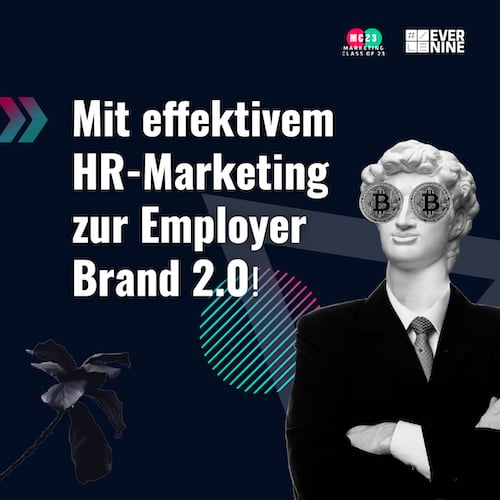
Are purpose-driven companies really more successful?

The term ‘purpose’ has become firmly established in marketing discourse, and companies are increasingly emphasising their contribution to society. However, there is a gap between aspiration and reality. Many companies struggle to convey a credible sense of purpose. In this article, Evernine, a Munich-based communications consultancy and full-service agency, shows the advantages and disadvantages of purpose-driven companies and how it can work, especially in times of increasing demand for employer branding.
The term ‘purpose’ has occupied a prominent place in marketing discourse for some time now. Today, no self-respecting brand can compete without a clear focus on its ‘positive contribution to society’.

The media repeatedly emphasise that purpose-oriented companies are more successful than average. And in the context of employer branding, purpose also acts as a miracle cure in the competition for new talent.
This development has now taken on a life of its own: everyone suddenly wants to save the world! Companies around the world want to realise their purpose in practice and link their plans closely to the topic of sustainability. But are purpose-driven companies really more successful?
As a communications consultancy, Evernine is confronted with this question time and again. First things first - in order to live purpose, a strong employer brand should first be established - and Evernine can help with this. Does that sound interesting to you? Then get in touch with our HR professionals directly.
Between aspiration and reality
Recent figures quickly bring us all back to reality: although many companies use the term ‘purpose’, trust in brands continues to dwindle. The latest Meaningful Brands Global Report 2023 from Havas Havas makes this unmistakably clear: a full 72 per cent of people are fed up with brands pretending to serve society when in reality their main goal is to maximise profits.
At the same time, consumer expectations have remained unchanged. Likewise, 72 per cent of respondents to the Meaningful Brands Report emphasise the importance of ‘collective justice’, i.e. being committed to the planet and society.
Even in the latest Purpose Readiness Index 2022 by Cologne-based management consultants Globeone only one in ten major German companies were able to fully convince with a credible purpose. Most companies simply lack the cultural foundation to convey credibility. This is precisely the underlying problem: purpose is originally only indirectly related to corporate social responsibility (CSR) and sustainability. Rather, it describes the drive of an entire company. What purpose does it follow? What does it stand for?
Purpose - More than just marketing

These issues are of crucial importance at all levels and in every area of an organisation. They do not primarily concern marketing, but rather the common spirit and basic attitude of an organisation. ‘Purpose’ is therefore deeply rooted in the DNA of a company. Consequently, companies are not successful by imposing a contemporary ‘purpose’ on themselves, but only if they already have one that they consistently follow. Anyone who believes they can deceive consumers with appealing headlines and images is making things too easy for themselves.
The results of the Purpose Study by Kienbaum and Human Unlimited top it all off. A whopping 60 per cent of the employees surveyed were unable to spontaneously name the purpose of their own company. Implementation therefore appears to be a real challenge!
Companies receive support from the expertise and know-how of an experienced communications consultancy and full-service agency such as Evernine. Visit our website for more information! !
Downsides of the purpose hype
Back to the marketing perspective: building brand trust is still the holy grail of brand management. Customer loyalty can only be achieved through consistency and reliability. The underlying questions remain the same: What do companies stand for? What promises do they make? An all too carelessly defined ‘purpose’ quickly becomes a broken promise. This in turn leads to a loss of trust.

And general brand trust is already on shaky ground: a full 71 per cent of the 395,000 consumers surveyed in the Havas report have little confidence in brands keeping their promises. Only 47 per cent of brands are still considered trustworthy.
Given the fact that most brands today shine with a purpose, this figure is alarming. Even more worrying is that 75 per cent of all brands could disappear overnight and the majority of people simply wouldn't care as they can easily find replacements.
Of course, the blame for this does not lie solely with the purpose. What is more worrying is that the fundamental benefits of a brand are increasingly failing to materialise.
Performance and quality often fall far short of expectations, which is known as the ‘experience gap’. What's more, these factors often decline in parallel with the company's sustainability efforts. This is where we need to realise at the latest: In marketing, purpose is not a sure-fire success. A purpose that is merely painted on does not really move a brand forward. Above all, it cannot compensate for weaknesses. In contrast to its cultural significance, purpose only becomes a decisive asset in marketing when the brand delivers its full performance. Trust is created through actions, not words.
Lack of substance & lack of internal communication

So the bigger the promise, the deeper the fall if it is not kept. The less substance a service has, the faster you fall out of favour. The hype surrounding purpose can therefore easily turn into a boomerang. The problem is that although most companies want to embrace all marketing trends, they lack an understanding of how to set up contemporary communication and information structures.
Do they really know their own guidelines? Do they even exist? Are they communicated within the company? Is there an open information culture with regard to the company's activities? Are employees informed and trained in strategic matters?
Unfortunately, this is rarely the case in most cases. Yet this is precisely the only right approach to benefit from Purpose. Without involving your own employees, this cannot succeed. And without integrating purpose-centred communication into an overall strategic concept, efforts in this area will come to nothing anyway. Companies can only realise their full potential by efficiently linking all areas, from marketing and sales to PR and HR, as Evernine shows with its connected marketing approach.
4 steps to more authenticity
Only then will a good purpose deliver the desired positive results. Many major brands have shown that honest and consistent action creates a clear competitive advantage. Their business figures also illustrate this.
The crucial question is how to utilise the power of purpose without falling into the purpose trap. The following four steps can help:
✅ 1. honesty
If you want to present your purpose authentically, you must first carry out a thorough self-reflection and clearly analyse who you are, what values the company embodies and how it actually behaves on socially relevant issues. In many cases, a sincere statement is more valuable than a staged attempt to save the world.
✅ 2. customer orientation
The first analysis often clearly shows how and where purpose-based added value can be created for customers. Ultimately, everything revolves around customer benefits. How can we enhance or refine established brand promises?
✅ 3. transparency
Today, customers critically scrutinise marketing promises. This is a good development, as the purpose is only effective if it is put into practice. If you want to utilise it in marketing, it is essential to make your own actions transparent. The more consistently you follow your own guidelines, the more effective your purpose will be.
✅ 4. orientation in complex times
This is where the exciting part begins: if you can explain your actions and the resulting added value on the basis of your own purpose, you are suddenly playing in the premier league: authentic customer orientation. In a complex world, customers literally crave this. We have to actively support them in making the right decisions - they honour this with their trust.

The purpose trend in marketing harbours potential, but also dangers. Authenticity and the realisation of purpose are crucial. Companies should be honest, focus on customer-orientation, transparency and orientation in complex times. The hype around purpose can turn into a boomerang if it is not backed up by action. Employee involvement and holistic communication are key to success. This is the only way for purpose to unfold its full effect and build lasting trust.
Evernine supports companies in developing a successful, purpose-based communication strategy that links all areas from marketing to sales, PR and HR and utilises their full potential. Further information can be found here.



